
Related
Topics
Phil Donahue–one of the best-known talk show hosts in the history of television in the United States–joins us in our firehouse studio to discuss the state of the media in this country. Donahue’s show was on the air for more than 29 years. In 2003, he was fired by MSNBC because he was allowing antiwar voices on the air. [includes rush transcript]
Before Jerry Springer created a show that looked more like a wrestling match than a talk show; before Oprah was a household name and before the explosion of cable news networks and the 24 hour talk show cycle, there was a daily program that millions tuned into every week for a national discussion on a wide range of social, political and personal issues. The show was simply called “Donahue” and was hosted by a bespectacled man with silver hair who would run around the studio handing the microphone to members of the audience to give them their say on the issues of the day. For many people watching or listening right now, it is probably unnecessary to say that that man was Phil Donahue. Throughout the 1980s, he was probably one of the most trusted personalities in this country.
Donahue first took to the airwaves in 1965. He hosted his radio program “Conversation Piece” in Dayton, Ohio. Two years later on November 6, The Donahue Show premiered on television with atheist Madalyn Murray O’Hair as its first guest. During the 1992 Presidential campaign, Donahue was credited with expanding the role of daytime television by featuring an unprecedented debate between then-candidates Bill Clinton and Jerry Brown. “The Donahue Show” was on the air for 29 years. In that time, Phil Donahue hosted more than 6,000 shows.
After years of being away from hosting that daily, national discussion, Donahue returned to TV in 2002 as the host of a nightly debate-style program on MSNBC. For many people, the show was a much-needed breath of fresh air on the cable networks, increasingly dominated by right-wing pundits and media personalities. Antiwar voices long kept off these cable news channels were suddenly given a seat in the forbidden studios to take part in a national debate about the so-called war on terror.
Here’s an example–this was in the lead-up to the invasion of Iraq.
- Phil Donahue on MSNBC interviewing Harry Belafonte.
Donahue was on in the same time slot as Fox’s Bill O”Reilly. But the show didn’t last long. In fact, it didn’t even last a year, even though it was MSNBC”s top-rated program. When Donahue was fired, the network moved to hire a string of right-wing hosts.
Phil Donahue joins us today in our studio.
- Phil Donahue, one of the best-known talk show hosts in the history of television in the United States. His show was on the air for more than 29 years. In 2003, he was fired by MSNBC because he was allowing antiwar voices on the air.
Transcript
AMY GOODMAN: This was in the lead-up to the invasion of Iraq on the Donahue show.
PHIL DONAHUE: Welcome to Donahue. I am joined tonight by one of the greatest entertainers of all time. He’s also famous for his political activism. He was a radical long before it was chic. Recently, Harry Belafonte has been embroiled in a controversy about comments he made about Secretary of State Colin Powell.
AMY GOODMAN: Then Phil Donahue played an interview with Harry Belafonte that had just aired on a San Diego radio station, KFMB, in California
HARRY BELAFONTE: There is an old saying in the days of slavery, there were those slaves who lived on the plantation, and there were those slaves who live lived in the house. You got the privilege of living in the house if you served the master to exactly the way the master intended to have you serve him. That gave you privilege. Colin Powell’s permitted to come into the house of the master, as long as he would serve the master according to the master’s dictates. And when Colin Powell dares to suggest something other than what the master wants to hear, he will be turned back out to pasture.
AMY GOODMAN: That was Harry Belafonte on KFMB radio in San Diego being rebroadcast on Donahue’s show on MSNBC. Phil Donahue was on in the same time slot as Fox’s Bill O’Reilly, but the show didn’t last — Phil’s, that is. In fact, it didn’t even last a year, even though it was MSNBC’s top rated program. When Donahue was fired, the network moved to hire a string of right wing hosts. Phil Donahue joins us in the studio right now. It’s great to have you with us.
PHIL DONAHUE: Hi, Amy. Nice to be here.
AMY GOODMAN: Well, we all learned about this memo, just soon after you were fired that came out of NBC, that was — that said that as we led into the invasion of Iraq, they didn’t want to have their flagship show, no matter how successful it was, the most popular show on MSNBC, being one that provided a forum for anti-war voices. They didn’t want an anti-war face when the other networks were waving the American flag.
PHIL DONAHUE: Right.
AMY GOODMAN: Your response?
PHIL DONAHUE: Well, that memo was a fact, and it was reported by The New York Times and other publications. Our program was doing reasonably well. We weren’t Elvis, but the program for its — the numbers of our program on the family of NBC — MSNBC at night, was very respectable, and I think had a prospect of growing even larger. So, the numbers did not warrant our departure, our dismissal. And along the way it became clear to us that they were terrified that we were going to become a place — an anti-war kind of platform, where all of these radicals would come and oppose the war.
AMY GOODMAN: Like Harry Belafonte.
PHIL DONAHUE: Yes, and others. We had some wonderful — for a peaceful tomorrow. I mean, I came back to television and ran right into a wall of widows. I mean, that shocked me. I just somehow wasn’t anticipating this. 9/11 widows. The New Jersey girls and these wonderful people, people who came on — mothers, wives said, “Not in my name. Don’t kill more innocent people to avenge the death of my loved one.” We just were very excited about what we were doing. Along the way, it became clear that they were really very nervous about us, and the rule was laid down, we had to have two conservatives for every liberal. I was counted as two liberals. I mean, this is the truth. So I was very, very naive, you know, for a veteran guy, I can’t get over — and there’s probably some vanity involved here, too. I thought I was going to be a place where dissent could be heard. I really believed that that was going to happen. And it was very naive of me to think that. It made them very, very nervous.
JUAN GONZALEZ: On the same — in the same vein, though, they knew your viewpoints and perspectives from the past.
PHIL DONAHUE: I can’t figure that, either. Yes
JUAN GONZALEZ: They knew that you are more open to having dissenting voices on, so what were they expecting, when they agree to — that you had mellowed?
PHIL DONAHUE: I think that they felt that — 29 years on the air, I mean, pretty high name recognition for good old Phil, and they figured, 'well, numbers,' you know? And they forgot perhaps that I meet be capable of featuring dissent. That’s the only answer I can give. It bewildered me, as well.
AMY GOODMAN: Let’s go back in time to Donahue, to this show you started when, in Dayton?
PHIL DONAHUE: November of 1967. When I said 1955, I want to say that was at the University of Notre Dame. I happened to do the picks in the morning. You know, sows and gilts and barrows. I didn’t know what I was talking about, but I was on the air, and it was 1955. I was 19 years old.
AMY GOODMAN: And Donahue, the Dayton show? How —
PHIL DONAHUE: 1967. November. A local show.
AMY GOODMAN: How you changed really, day time talk. What did you do? What was different about it?
PHIL DONAHUE: Well, we knew we were visually boring. We — and television was filled — Monty Hall was on the other channel giving away $5,000 to a woman dressed like a chicken salad sandwich, and Bob Barker was saying, “Come on down!” And people were screaming and yelling, and here comes Donahue with one talking head and a group of women sitting on folding chairs. We had two cameras. It was live. And it soon became — we knew that we had to — and we were in Dayton, so — you know, celebrities were not on call for us. I had been listening to WBZ in Boston, a chap by the name of Bob Kennedy, no relation to the political family. I remember him so very well. He’s no longer with us, but he was fabulous. It was a Westinghouse station, and I could hear it in Dayton. And he was putting on people long distance on the, you know, on the phone. And so I started doing that on radio in 1965, maybe. And so, that’s what translated to the TV show, and my first guest was Madelaine Mary O’Hare who came on the program.
AMY GOODMAN: The atheist.
PHIL DONAHUE: Atheist who effected the Supreme Court decision banning the official reading of prayer in school. ’There’s no God, there’s no heaven, there’s no hell. When you die, you go into the ground. The worms eat you, you biodegrade, and you become part of the physical universe.’ Well, the building fell down. All of Dayton came to a halt. It really was quite a sensation, as I knew it would be. And I knew it better be, or we wouldn’t — we were very nervous about how long we would last, as I say, because we were visually boring, so we had to survive on issues. And she brought issues. 'I don't care if you worship a pet rock, you pay for it. I’m tired of paying more taxes because of your churches getting phony tax relief that causes my taxes to — ’ oh, I mean, she was fabulous. And also, you know, a very, in many ways, a very, very unpleasant woman whom I happened to really like. I liked her a lot and still do and have fond memories of her, and sorry about her grim death.
JUAN GONZALEZ: Over the years, obviously, you have been now witness to the evolution of television and its power over the American population. What do you — what do you say, in looking at it, are some of the main concerns that you have about how the medium has evolved?
PHIL DONAHUE: Well, you know, free speech to me means that — I didn’t have — I did not — I was a newsman in Adrian, Michigan. I didn’t have to take a test. I didn’t have to pee in a bottle. I didn’t have to appear before a board. I just became a journalist. I covered City Hall. Anybody can be a journalist, even me. Very good idea, because it means that you’ll have a lot of people being journalists or getting news. If you have a lot of people getting news — sorry about this 101 lecture — somewhere in the collective middle will be found the truth. Today, that collective middle is occupied not by a whole lot of people, but by fewer and fewer corporations, larger and larger in size, much more concerned about the bottom line than they are about sticking their nose under the tent.
AMY GOODMAN: Phil, you have been talking about media corporations for quite a long time. I want to go back to 1995 to the Donahue show, when you had among your guests, Jim Hightower. Let’s take a listen.
PHIL DONAHUE: Here’s what he said about Michael Eisner, Chairman of the Board of Disney, before Disney buys the radio network he’s on. Go get ’em, Jim Hightower. Here you go on the radio.
JIM HIGHTOWER: Did you make $78,000 last year? Probably not. Less than 5% of Americans make that much. But Michael Eisner, top dog at the Disney Entertainment conglomerate made $78,000, not for the year, not for a month or even a day. Last year, he pocketed $78,000 an hour, $203 million for one year. Plus, benefits and free passes to Disneyworld.
PHIL DONAHUE: [singing]When you wish upon — alright, Jim, not so funny, McGee. You lost your job.
AMY GOODMAN: Phil Donahue with Jim Hightower. We’re going to go to break and come back. When Phil played another of Jim Hightower’s commentaries, it had to do with his boss being a rodent, but anyway, we’ll be back with Phil Donahue in a minute.
[break]
AMY GOODMAN: Our guest is Phil Donahue, fired from MSNBC in the lead-up to the invasion of Iraq, the network not wanting to have an anti-war face on their network. But presenting a forum for dissident voices was not just Phil Donahue in 2002. Again, back in 1995, among others, guests, Jim Hightower was on his program, and well, it was right around the time when Disney was taking over ABC. Let’s take a listen.
PHIL DONAHUE: Tom Murphy has just announced we’re being bought by Disney.
JIM HIGHTOWER: Right.
PHIL DONAHUE: And Michael Eisner and Tom Murphy appear before the press and announce this biggest mega-merger in the history of telecommunications, and you got the nerve, you have a death wish my good man. Here’s what you said on your own radio show, ABC.
JIM HIGHTOWER: Jim Hightower, on a Saturday coming to you with Hightower Radio, coming to you as always through the magic of the ABC radio networks.
MICKEY MOUSE: Uh, Jim, I have got news for you.
JIM HIGHTOWER: Who is this?
MICKEY MOUSE: Well, this is your new boss, from the chairman of the board.
JIM HIGHTOWER: Mickey Mouse?
MICKEY MOUSE: That’s right. Mickey Mouse. And I have got with me, Donald Duck.
DONALD DUCK: Hey, how ya doing? Hold everything.
JIM HIGHTOWER: Well, we can’t just hold everything. We’re going to be back later with my interview with my new bosses at ABC. Mickey Mouse? A rodent?
AMY GOODMAN: Jim Hightower on Donahue, on the Phil Donahue show. Remember?
PHIL DONAHUE: Oh, yes, I do. I can’t get over how — I actually took for granted the opportunity to do programs like that. That was very exciting to punch the biggest — you know, to kick those kind of tires, to pop off about — against powerful institutions and people was very, very exciting. And it’s really — it’s certainly noticeable, the absence of that today.
AMY GOODMAN: Has the media regressed?
PHIL DONAHUE: Oh, I don’t think there’s any doubt about it. I think we are all — everybody is under pressure to shut up and sing. And dissent is a vehicle of entertainment, really. I admire so much those progressive people who do get on Fox. By the way, progressives are more likely to be found on Fox than anywhere else, because they’re inoculated against being — against any suggestion that they’re anti-American. The people in the middle are the ones who — Michael Moore has never been on Meet the Press. Michael Moore has never been on Face the Nation. Imagine, this is — he was considered Time magazine Man of the Year. I mean, it was in consideration. The documentary — lines around the world — around theaters around the world, certainly the center of the 2004 presidential campaign, this documentary. He was invited on Larry King but then dis-invited when the White House refused to send a balancing act. So, the White House, by refusing to send a balancer, was able to control him. I am — this is — he was on George Stephanopoulos, ABC, but edited to a fairly well — it was pre-taped and then edited. This is Karl Rove. You put Michael Moore on, you don’t get Condi. You don’t get access. You don’t get Colin. These are the legitimizing heavyweights that grant gravitas to the Sunday morning programs. It’s just —- it’s amazing. Follow the ball—-
JUAN GONZALEZ: But those big media companies would argue and conservatives would argue that obviously with the explosion of cable and all of these other channels now, that there are many more vehicles for shows to get out. What’s your response to that?
PHIL DONAHUE: They do argue that, and it’s a chimera. It’s — look, I mean, just — I have the Dish. I have more channels than is good for the average man. And they’re all selling the bowflex machine or Jesus or jewelry. And then if you look long enough somewhere in the mix you will find some wonderful, wonderful ideas, History Channel, to name one. And I find myself now, because I was once a member of team, the gang — I once had a cable show in prime time. It seems like another life ago. I watch — I watch Fox, and I watch MSNBC. I am looking at these personalities with very keen professional and very personal interests, because I used to be there.
AMY GOODMAN: What was it like when you were doing Donahue on MSNBC, when you were doing the show? What kind of pressures did you face there? I mean, if you brought on an anti-war voice, how many pro-war voices did you need?
PHIL DONAHUE: Well, we didn’t realize until somewhere when they got nervous. You know, we were saying some — we were — I was suggesting — why is Donald Rumsfeld calling France “Old Europe?” I mean, why is the Secretary of State a smart alec? How does this help our troops? How does this help — we were, well, Donald Rumsfeld — I mean, this was a General Electric property I was on. By the way, along — somewhere along the way here, I wondered, you know, MS means Microsoft. I often wondered, do Bill and Melinda Gates watch MSNBC? You know, they hired Michael Savage.
AMY GOODMAN: That’s who followed you.
PHIL DONAHUE: Yes. But I’m very conflicted about this. A lot of people who worked for me went to other programs, so I would like this channel to succeed. I am rooting for Ron Reagan, Jr. I happen to like him. I think he’s a very informed civil voice amid all of the bomb-throwers. And the music. I mean, we literally had the drums of war leading into this. But I was gone before the war — before they reached Baghdad, we were gone.
AMY GOODMAN: Were they bringing you into their offices?
PHIL DONAHUE: No, they brought our — I would send — I’m a coward. I would — Marlaine Selip was our E.P.
AMY GOODMAN: Wasn’t she for Donahue, as well?
PHIL DONAHUE: Yes. She came from the old daytime —
AMY GOODMAN: We’re going way back.
PHIL DONAHUE: Yes. We’re all connected at the hip. And, you know, I sent her in.
AMY GOODMAN: And what would they tell her?
PHIL DONAHUE: First the pressure was to put on Doris Roberts of Everyone Loves Raymond. Let’s have some celebrities here. Remember, I had no power. And I was a guy who came from a lot of power. The Donahue show for years was an 800 pound gorilla. I was very, very spoiled, and probably brought this vanity to this — that’s why I cannot get over how naive I was. We didn’t have power. We didn’t have the audience that allowed anybody to stomp around. So I wanted to save the ship. I remember, Studs Terkel came in, and he said, “You have crossed the Rubicon.” And I thought, well, I don’t know how — we haven’t crossed yet, we’re in the middle of some very choppy waters here. And we wanted everybody to grab an oar. And so I felt, let’s go there, let’s save the show by not getting uppity. And that’s not why I came here. I didn’t come here to do — God bless Doris Roberts, she’s a wonderful person. We happened to turn the interview into an interview about ageism and feminists. It was good.
AMY GOODMAN: You’re incorrigible.
PHIL DONAHUE: Well, we didn’t have — we couldn’t kick tires like we did on the old show. It was tough.
AMY GOODMAN: Talk about that. That old show, because, I mean, one of the things I think that you paved the way on, what was groundbreaking, was respect for women. Talk about the role of the audience.
PHIL DONAHUE: Well, this — thank you, this was — we were very, very lucky. First of all, we inherited an audience from the show that we replaced. So, here comes — and the show we replaced had a pianist and a band, and you could wave. The camera would pan. And you won a prize, and here comes Donahue with Madelaine Mary O’Hare and women in the audience and no piano player, and you can’t wave. So along the way, like in the first week, I realized that during the commercials, these women were asking better questions than the host. So, one day, it was really not anything we planned. I jumped out in the audience, and all of a sudden, a community started to develop between the audience, the guest and me. A woman who is a mother whose daughter was fasting in the Green County jail after having been arrested at Antioch for — in a war protest, fasting to protest the war, happened to be Quaker. And the women in the audience were appalled. Well, what if she starves to death? And this mother would say, “Why aren’t you worried about the 300 men coming home every week in plastic zippered bags from this Southeast Asian war?” Why don’t you worry about — and I couldn’t get to these women. I couldn’t get to them fast enough. And suddenly, we had something that no one else on television had. I mean, it was very, very lucky, really.
JUAN GONZALEZ: That’s interesting, you helped to bring a certain element of democratization into television, bringing the people in—
PHIL DONAHUE: Yes.
JUAN GONZALEZ: And getting them involved.
PHIL DONAHUE: Allowing them to use the airwaves that belonged to them in the first place. Very radical idea. We would go on the road to our various stations. We did a week of shows from almost every modestly large city in this nation. And we would see an attitude which — of the executives at these local television stations was essentially would say, this is a great business if we didn’t have to have these people coming in here all the time. So, we’re very, very proud of the fact that we did. We put the cameras that used to be in front of the audience in back and allowed them to stand up.
JUAN GONZALEZ: But then what happened, obviously, is that there were a lot of imitators of your model, and eventually one of them became practically an institution in the country: Oprah.
PHIL DONAHUE: Oprah is more than an institution. Oprah is a very special star in the firmament. I mean, I can’t imagine a greater success than she’s enjoyed, and I should say, a woman who has taken advantage of her power and her platform to do some very, very good, wonderful issues, ideas, featured people that otherwise would not have a voice. So, my hat’s off to her.
AMY GOODMAN: You also pioneered working your way up from the local stations, more and more came onboard. It was tremendously successful. Hundreds of stations around the country, and didn’t come from the network. Do you think you would have faced more pressure if you had been here in New York and you had been broadcasting out to all of these stations as opposed to building them one by one?
PHIL DONAHUE: I don’t think we would have survived.
AMY GOODMAN: Why?
PHIL DONAHUE: On the network. Because — well, we put Jane Fonda on very early. And Bob Evans, the farm sausage guy, to name just one sponsor, wrote the letter: “I will not sponsor any program that tears down America.” Pretty simple for Bob.
PHIL DONAHUE: So, you weren’t putting out sausages anymore?
PHIL DONAHUE: I don’t recall whether he canceled. He may have. What the beauty of syndication is, if we lost Peoria, we still had Indianapolis. It was something —- it’s more honest, really. It was built one brick at a time. In a network situation, a vice president, while he’s shaving, which I think is what happened to me at MSNBC, can decide your history. So, the syndicated model -—
JUAN GONZALEZ: If he cuts himself that morning, especially.
PHIL DONAHUE: The syndicated model is more honest, more democratic, and I think allows for greater dissent and controversy.
AMY GOODMAN: Where do you go from here? And do you think that you’ll be speaking out more on media consolidation?
PHIL DONAHUE: Well, I haven’t — I haven’t necessarily been totally silent, but it’s certainly true that I — you know, this gets your attention. I have said — I say I am so spoiled. I very much enjoy popping off about these issues. And reading about the people, like yourself, who have been — become aware and truly insightful about how important — I could never understand how we could put 120,000 Japanese behind a fence in World War II. I remember being bewildered, how could the United States have — I don’t have any more confusion about that. I realize what you can do when you scare the population and how media contributes to that. And all of these young men who died on foreign battlefields to protect our way of life, and at the center of that is dissent. Not to dissent is to waste their sacrifice. Don’t tell us to shut up. Don’t take our flag; this is our flag. I mean, these people have —- with the megaphone of the White House, have obviously convinced a significant number of people that they have God and we don’t. They -—
AMY GOODMAN: Do you think the media is the megaphone for the White House?
PHIL DONAHUE: I certainly think Fox is. And I think that —
AMY GOODMAN: MSNBC?
PHIL DONAHUE: Well, MSNBC couldn’t wait to hire Scarborough.
AMY GOODMAN: NBC?
PHIL DONAHUE: Well, I think — I think NBC and — you know, I think NBC News is doing everything that it can. I think there’s some wonderful things happening on the evening news on the three networks. I wish it were longer than 22 minutes. I’m glad Tom Brokaw resisted wearing an American flag in his lapel. I think this has become such false piety. I admired him for not groveling to the right wingers who can’t — you know, there aren’t enough flags for them to stand in front of. And there aren’t enough — you know, they’re “God blessing” this and that and everything in between. I mean, God himself must be wincing at this pretense and this false piety. We’ve — somebody out there has got to help you bring us down from this.
JUAN GONZALEZ: Yet all the network news also were cheerleaders for the war, and were only critical afterwards.
PHIL DONAHUE: Right. Yeah. I’m certainly not comfortable —- you know, I remember when guys would retire from television -—
AMY GOODMAN: Ten seconds.
PHIL DONAHUE: “Boy, it’s not what it used to be.” And I would say, “Oh, come on, stop it, stop it.” I don’t want to be one of those people, but I certainly think we have an emergency in media, and we gotta fix it.
AMY GOODMAN: Phil Donahue, I want to thank you for being with us. We’ll all be together on Monday night, December — March 28th, right here in New York. It feels like December, I’ll tell you, with the snow outside. We will be kicking off our Un-Embed the Media Tour at the Ethical Culture Society in New York. That’s Monday night at 7:00 here in New York.

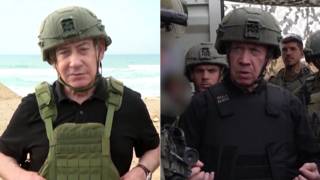
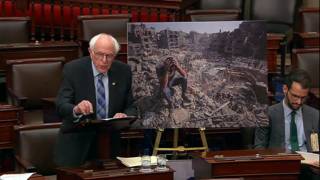
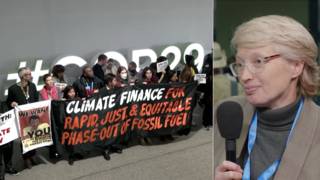
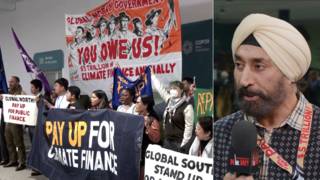





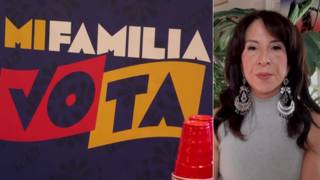
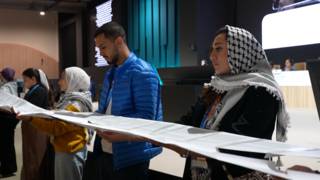
Media Options